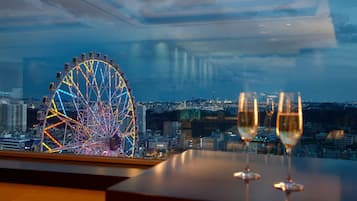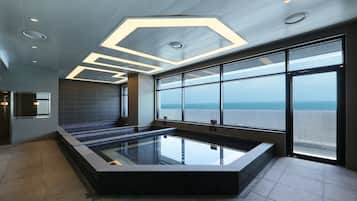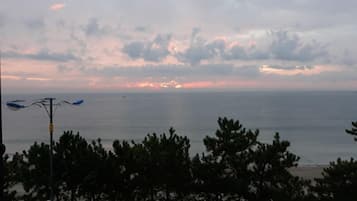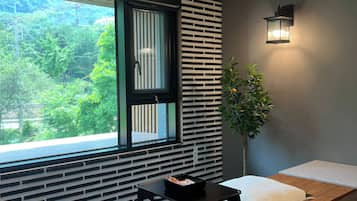Our Ulsan Travel Essentials guide offers valuable information about all the essentials you need for a successful holiday to South Korea's industrial powerhouse. In this guide, you'll find information about the local climate, emergency phone numbers, electricity and outlet style, currency and more. We even give details on how to get to your hotel and travel around Ulsan after you arrive.
One of the best ways to get to know a city is to attend local festivals and see popular landmarks. That's why this guide provides insight into both, allowing you to hit all the top spots easily. This guide is the key to getting the most out of your holiday in Ulsan.
When is the best time to travel to Ulsan?

- Temperatures vary quite a bit based on the time of year you visit, with average temperatures in the summer reaching 26.1°C and winter temperatures averaging about 2.1°C.
- The rainy season in Ulsan is around late summer and early autumn, peaking in July with 24.1 centimetres of rain that month.
- Warm weather is most common in August with highs around 30.5°C, although July can also be fairly hot, with highs around 29.6°C.
- Spring tends to be the most popular time to visit, thanks to the comfortable temperatures and low levels of rain, but the winter can be fun too if you don't mind the cold and want to get away from crowds.
Ulsan basics

• Plug type: C or F
• Electricity: 220V
• Currency: South Korean won (₩)
• International dialling code: +82
• Emergency telephone number: 112
Ayrıca bkz.
- 10 Best Natural Wonders in Ulsan

10 Best Natural Wonders in Ulsan
South Korea - 10 Best Free Things to Do in Ulsan

10 Best Free Things to Do in Ulsan
South Korea - 8 Great Restaurants in Ulsan

8 Great Restaurants in Ulsan
South Korea
How to get to my hotel in Ulsan?

Ulsan is a bustling town with plenty of ways to get in, but it doesn't have an international airport of its own. Fortunately, many nearby cities and regions do, so you won't be too far away when you land in South Korea. After landing, you can choose between a comprehensive bus network and rail lines. Taxis are prominent, too, so you can mix and match options to determine which is best for you.
Airports
Ulsan doesn't have an international airport of its own, but its domestic airport can be useful if you're already in Seoul. When flying in from the UK, however, you may be better off landing in Daegu or Gimhae. From there, you can easily take the train or bus to Ulsan.
Major train stations
Ulsan Station, also known as Tongdosa, is the central high-speed rail station of the city. It's a stop on the Gyeongbu High-Speed Railway, which connects to Busan, Seoul, Osong, Daejeon and other locations.
Ports
Ulsan has a major port, but it's used exclusively for commercial trade, with the sole exception being passengers coming in to work at the port. Recreational travellers will find the nearest port in Busan.
fotoğraf: 인생살이 (CC BY-SA 4.0) değiştirildi
How to get around Ulsan?

Travel tips
The main way to get around town is via the bus network, as it connects virtually every important spot in the city and its surrounding areas together. If you plan to use the bus, make sure you pick up a discount card to receive a 50 won reduction on fares and free transfers. They're available at vendor shacks next to every major bus stop.
Underground system
There is no underground in Ulsan, and the train is primarily used to get in and out of town rather than around the town itself. Still, there are some connections to the city centre from stations in Hogye to the north and Deokha, Seosaeng and Onyang in the south.
Taxi and rideshare apps
Rideshares aren't too common in South Korea since the government cracked down on them, but they are slowly being introduced. Uber isn't available, for instance, but Banban Taxi does work as a rideshare service. Traditional taxis are available as well, and they're relatively cheap. Remember that the buses don't run at night, so taxis may be your only option if you're staying out late.
Bus network
The bus network is the primary way for residents and travellers alike to get around town. You'll find connections virtually everywhere, but they can be lengthy if you're travelling long distances. Still, it's cheap to travel long distances via bus since they charge a flat rate whether you get off at the next stop or after 10 stops. Remember to get on in the front and get off at the back.
Car hire
Hiring a car is a fairly handy way to get around town, and it's one of the fastest. There's plenty of parking and a wide variety of hire cars available. You just need to have an International Driving Permit from your country of origin, so have that with you before you leave for South Korea if you plan on driving.
Bike hire
Biking is a common way to get around town, and there are hire locations throughout the city, though they're more common near the city centre. Like most of South Korea, the roads are bike-friendly, and you'll even find several bike paths in the area.
fotoğraf: Shidong (CC BY-SA 3.0) değiştirildi
What are the main annual events in Ulsan?

Ulsan Whale Festival
- When: July
- What: The Ulsan Whale Festival celebrates the prominence of whales off the coast of the city with plenty of ways to take part. The whale-watching cruise is one of the most popular, of course, but you can also explore the Whale Life Experience Museum. Fun and discovery are around every corner, with special sites that have different offerings each year in addition to the standard cruise and museum.
- Where: Jangsaengpo Whale Culture Special Zone
Ulsan Rose Festival
- When: May
- What: The Ulsan Rose Festival is an exciting festival that features a wide variety of roses blooming in well-maintained and designed gardens within Ulsan Grand Park. In addition to the flowers themselves, you'll find art installations and an exhibition hall with exhibits designed to delight all 5 senses. The festival's ultimate goal is to highlight Ulsan's cultural charm.
- Where: Ulsan Grand Park Rose Garden and Nammun Plaza
Ulsan Onggi Festival
- When: October
- What: The Ulsan Onggi Festival celebrates one of the country's largest onggi villages, which is a type of village known for creating traditional Korean earthenware. Several master artisans reside here, and you can see them show off their craft and teach about the traditional art of onggi. Hands-on experiences are common, but you can simply try to find the best piece to take home if you like.
- Where: Oegosan Onggi Village
What are the main landmarks in Ulsan?

Taehwaru Pavilion
The Taehwaru Pavilion is a historic pavilion dating back to the 12th year of Queen Seondeok's reign in the Silla period. When you visit this pavilion, you'll find a great example of historic architecture, but that's just the beginning. It also offers a picturesque view of the Taehwagang River and the Taehwagang National Garden.
Jangsaengpo Whale Museum
The Jangsaengpo Whale Museum is a historic museum focusing on the rich history of whaling in Ulsan. At this museum, you'll be able to explore a variety of different artefacts from the long history of whaling - a practice that was banned throughout the country in 1986. There's a dolphinarium here as well, where you can see live dolphin performances.
Daewangam Park
Daewangam Park is a seaside park in town with a scenic walking trail taking visitors past a variety of trees, including magnolias, cherry blossoms and pines. The lighthouse here is also quite iconic and historic. Don't forget to check out Daewangam Rock when you visit, which is a rock that appears as if a stone dragon is rising into the sky. The bridge and walkway are lit with colourful lights at night, so consider visiting after dark.
Seosaengpo Japanese Fortress
Seosaengpo Japanese Fortress is a historic stone fortress built during the Japanese invasion in the late 16th century. It's set atop a mountain about 200 metres above sea level while the walls themselves tower 6 metres high at a 15-degree angled slant. It's a protected cultural property in the modern era, and you can visit all its historical splendour for free.
Bu makale, Go Guides yayın ekibinin görüşlerini içermektedir. Hotels.com, bu sitede görünen yazıların karşılığında yazarları tazmin eder. Bu, seyahat masraflarının veya diğer masrafların karşılanması şeklinde olabilir.
Seyahatinizi planlamaya başlayın
Ulsan bölgesinde nerede kalmalı?

Lotte City Hotel Ulsan
Lotte City Hotel Ulsan

Shilla Stay Ulsan
Shilla Stay Ulsan

Lotte Hotel Ulsan
Lotte Hotel Ulsan

Hotel Hyundai by Lahan Ulsan
Hotel Hyundai by Lahan Ulsan

Toyoko Inn Ulsan Samsandong
Toyoko Inn Ulsan Samsandong

Mercure Ambassador Ulsan
Mercure Ambassador Ulsan

HOTEL EAT COM
HOTEL EAT COM

Ulsan City Hotel
Ulsan City Hotel

Residence Hotel Blue Ocean View
Residence Hotel Blue Ocean View

HOTEL KANWOLGE
HOTEL KANWOLGE
İlgili yazılar
- 10 Best Natural Wonders in Ulsan

10 Best Natural Wonders in Ulsan
South Korea - 10 Best Free Things to Do in Ulsan

10 Best Free Things to Do in Ulsan
South Korea - 8 Great Restaurants in Ulsan

8 Great Restaurants in Ulsan
South Korea - 10 Best Things to Do After Dinner in Ulsan

10 Best Things to Do After Dinner in Ulsan
South Korea - 10 Best Family Things to Do in Ulsan

10 Best Family Things to Do in Ulsan
South Korea - 10 Best Local Restaurants in Ulsan

10 Best Local Restaurants in Ulsan
South Korea - 9 Best Things to Do in Ulsan

9 Best Things to Do in Ulsan
South Korea - 10 Best Places to Go Shopping in Ulsan

10 Best Places to Go Shopping in Ulsan
South Korea
